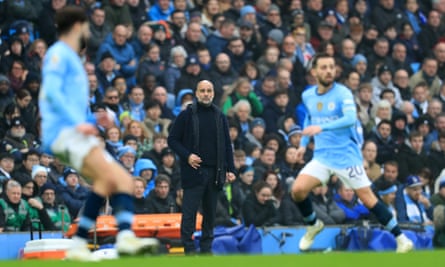Spain are the European champions. Real Madrid won the Champions League. Rodri won the Ballon d’Or and has only come to seem more important since suffering an anterior cruciate ligament injury. Spanish managers won the Premier League, the Bundesliga and Ligue 1 last season. No fewer than five Premier League clubs are managed by Spaniards.
It has been another year of Spanish domination but the manager who more than anybody has been the architect of what is now considered the Spanish style is facing the biggest crisis of his career.
The speed of Manchester City’s unravelling has been remarkable. It is only two months ago that everything began to go wrong as City lost in a Carabao Cup tie at Tottenham. The reasons are manifold but, from a tactical point of view, two elements stand out.
First, that pressing is a high-risk way of playing the game. Operating with a high line squeezes the play and employs offside as an offensive tool, helping a side regain the ball, but it leaves an obvious vulnerability if insufficient pressure is put on an opponent in possession. Liverpool suffered similarly in 2020-21, minor glitches leading to a meltdown when they lost eight times in a run of 12 games – although there was never such a sense of distance between coach and squad as there appears to be at City. This is one of football’s great strengths as a sport: almost any ploy comes with jeopardy, strengths can readily become weaknesses.
Second, that the flower can never be allowed to come fully into bloom. Erling Haaland has never been a natural fit for Pep Guardiola. Guardiola demands control. He wants his teams to hold possession until they get themselves into a position from which they can thwart a breakaway should possession be lost. Haaland likes the ball played forward quickly. Kevin De Bruyne is extremely adept at playing those instant passes but, necessarily, that means City are not so well set if the more direct ball leads to a turnover.

Last season, City conceded a league-high seven times to fast breaks. This season, the problem has worsened, with City offering up 25 chances to fast breaks, more than anybody other than West Ham. Last Saturday, against Aston Villa, Youri Tielemans picked City apart again and again, exploiting the space behind the defensive line while being placed under little pressure. On Boxing Day, Everton had a number of chances for breakaways, limited only by their own extraordinary lack of pace.
A parallel can perhaps be seen in Ajax under Stefan Kovacs or Liverpool under Kenny Dalglish, releasing their players from the strictures that they had previously performed under, adopting a more overtly attractive style of play, and being rewarded with a triumph that won great public acclaim.
For Ajax, that was the 1973 European Cup, as they humiliated Juventus in the final, winning 1-0 but keeping the ball from them in a display of extreme mastery. For Liverpool, it was the 1987-88 league title as John Barnes and Peter Beardsley transformed them into a thrillingly attacking side. For both, though – acknowledging other factors were at play – the sense was that the moment the fruit was at its sweetest was also the moment the plant began to decay.
Haaland similarly, by giving City a more varied mode of attack, alleviating the sense that their very structured approach could become predictable against the best defences, helped them at last to lift the Champions League. The cost, though, was perhaps that same pattern of maturation and decline: quite apart from the fact his demand for instant service means City cannot set themselves, he is not, for all his gifts in the opposition area, for all his pace and strength and finishing, somebody who is going to drop into midfield to engage in the defensive phase. With Rodri in the side, City could – just about – cope with a player who did not entirely sublimate himself to the whole; without him they have not been able to.
But there is also a broader point, which is the Guardiola style has become hegemonic. Almost every team press and possess now – so much so that Nuno Espírito Santo’s preference at Nottingham Forest for a deep-lying and compact core, springing forward through rapid wide men, seems radical. When everybody is a guardiolista, being guardiolista is not enough. Even Guardiola has tweaked and evolved in recent seasons; increasingly it feels that variations of guardiolismo have taken over. The pure form of his philosophy, that Barcelona embodied in winning the Champions League in 2009 and 2011, has been superseded.
after newsletter promotion
It may be that the age of ideologues is over and pragmatism is back. Russell Martin, Ange Postecoglou, even Ruben Amorim, have found, in their different ways, that insisting flaws are an inevitable result of how they do things isn’t really adequate. Luis de la Fuente won the Euros by adding a pair of direct wingers to the classic possession-based Spain model. Coaches such as Mikel Arteta, Andoni Iraola and Unai Emery play variations of the Guardiola/Spain model.
Beyond the immediate influence of Spain, flexibility and adaptability are in vogue. Carlo Ancelotti continues to be extraordinarily successful in part because of the excellence of his squad, but also because of his resolute pragmatism. Lionel Scaloni added another Copa América to his roll of honour with Argentina with a series of game-specific tweaks to his midfield.
Slightly more conservative than his predecessor, Arne Slot has taken Liverpool towards a more guardiolista variant of the Jürgen Klopp style. Gian Piero Gasperini’s Europa League winners, Atalanta, top in Serie A, do press but in a way that is more considered than the blood-and-thunder, percussive style that was so popular for a time. Even the renewed focus on set plays can be seen as an element of the new pragmatism.
First there was juego de posición, which reimagined Total Football for the modern age; then there was the Kloppite response, focused less on retaining the ball than regaining it. This now is the era of synthesis, of minor variations on the dominant theme that was established through the Guardiola-Klopp rivalry, at which Spain, currently, is excelling.
Source: theguardian.com


















